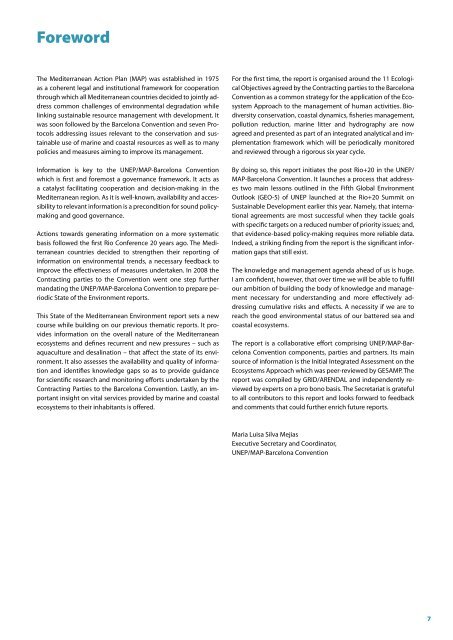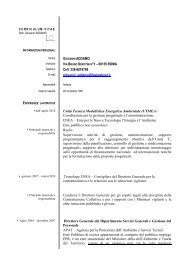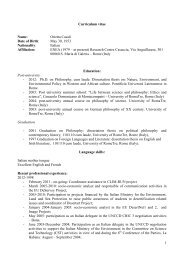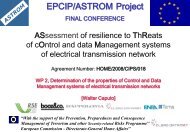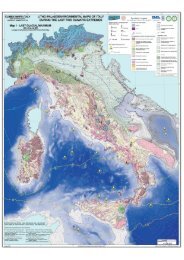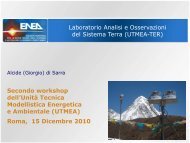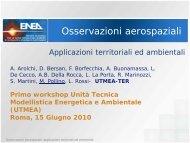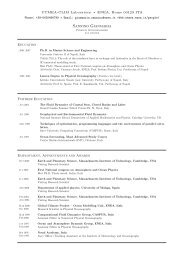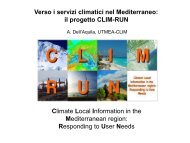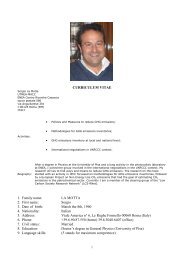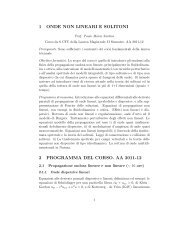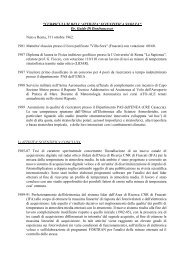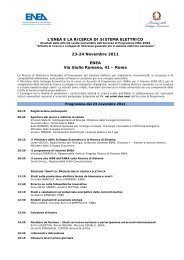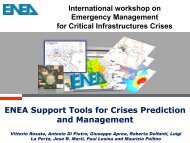State of the Mediterranean Marine and Coastal Environment
State of the Mediterranean Marine and Coastal Environment
State of the Mediterranean Marine and Coastal Environment
You also want an ePaper? Increase the reach of your titles
YUMPU automatically turns print PDFs into web optimized ePapers that Google loves.
Foreword<br />
The <strong>Mediterranean</strong> Action Plan (MAP) was established in 1975<br />
as a coherent legal <strong>and</strong> institutional framework for cooperation<br />
through which all <strong>Mediterranean</strong> countries decided to jointly address<br />
common challenges <strong>of</strong> environmental degradation while<br />
linking sustainable resource management with development. It<br />
was soon followed by <strong>the</strong> Barcelona Convention <strong>and</strong> seven Protocols<br />
addressing issues relevant to <strong>the</strong> conservation <strong>and</strong> sustainable<br />
use <strong>of</strong> marine <strong>and</strong> coastal resources as well as to many<br />
policies <strong>and</strong> measures aiming to improve its management.<br />
Information is key to <strong>the</strong> UNEP/MAP-Barcelona Convention<br />
which is first <strong>and</strong> foremost a governance framework. It acts as<br />
a catalyst facilitating cooperation <strong>and</strong> decision-making in <strong>the</strong><br />
<strong>Mediterranean</strong> region. As it is well-known, availability <strong>and</strong> accessibility<br />
to relevant information is a precondition for sound policymaking<br />
<strong>and</strong> good governance.<br />
Actions towards generating information on a more systematic<br />
basis followed <strong>the</strong> first Rio Conference 20 years ago. The <strong>Mediterranean</strong><br />
countries decided to streng<strong>the</strong>n <strong>the</strong>ir reporting <strong>of</strong><br />
information on environmental trends, a necessary feedback to<br />
improve <strong>the</strong> effectiveness <strong>of</strong> measures undertaken. In 2008 <strong>the</strong><br />
Contracting parties to <strong>the</strong> Convention went one step fur<strong>the</strong>r<br />
m<strong>and</strong>ating <strong>the</strong> UNEP/MAP-Barcelona Convention to prepare periodic<br />
<strong>State</strong> <strong>of</strong> <strong>the</strong> <strong>Environment</strong> reports.<br />
This <strong>State</strong> <strong>of</strong> <strong>the</strong> <strong>Mediterranean</strong> <strong>Environment</strong> report sets a new<br />
course while building on our previous <strong>the</strong>matic reports. It provides<br />
information on <strong>the</strong> overall nature <strong>of</strong> <strong>the</strong> <strong>Mediterranean</strong><br />
ecosystems <strong>and</strong> defines recurrent <strong>and</strong> new pressures – such as<br />
aquaculture <strong>and</strong> desalination – that affect <strong>the</strong> state <strong>of</strong> its environment.<br />
It also assesses <strong>the</strong> availability <strong>and</strong> quality <strong>of</strong> information<br />
<strong>and</strong> identifies knowledge gaps so as to provide guidance<br />
for scientific research <strong>and</strong> monitoring efforts undertaken by <strong>the</strong><br />
Contracting Parties to <strong>the</strong> Barcelona Convention. Lastly, an important<br />
insight on vital services provided by marine <strong>and</strong> coastal<br />
ecosystems to <strong>the</strong>ir inhabitants is <strong>of</strong>fered.<br />
For <strong>the</strong> first time, <strong>the</strong> report is organised around <strong>the</strong> 11 Ecological<br />
Objectives agreed by <strong>the</strong> Contracting parties to <strong>the</strong> Barcelona<br />
Convention as a common strategy for <strong>the</strong> application <strong>of</strong> <strong>the</strong> Ecosystem<br />
Approach to <strong>the</strong> management <strong>of</strong> human activities. Biodiversity<br />
conservation, coastal dynamics, fisheries management,<br />
pollution reduction, marine litter <strong>and</strong> hydrography are now<br />
agreed <strong>and</strong> presented as part <strong>of</strong> an integrated analytical <strong>and</strong> implementation<br />
framework which will be periodically monitored<br />
<strong>and</strong> reviewed through a rigorous six year cycle.<br />
By doing so, this report initiates <strong>the</strong> post Rio+20 in <strong>the</strong> UNEP/<br />
MAP-Barcelona Convention. It launches a process that addresses<br />
two main lessons outlined in <strong>the</strong> Fifth Global <strong>Environment</strong><br />
Outlook (GEO-5) <strong>of</strong> UNEP launched at <strong>the</strong> Rio+20 Summit on<br />
Sustainable Development earlier this year. Namely, that international<br />
agreements are most successful when <strong>the</strong>y tackle goals<br />
with specific targets on a reduced number <strong>of</strong> priority issues; <strong>and</strong>,<br />
that evidence-based policy-making requires more reliable data.<br />
Indeed, a striking finding from <strong>the</strong> report is <strong>the</strong> significant information<br />
gaps that still exist.<br />
The knowledge <strong>and</strong> management agenda ahead <strong>of</strong> us is huge.<br />
I am confident, however, that over time we will be able to fulfill<br />
our ambition <strong>of</strong> building <strong>the</strong> body <strong>of</strong> knowledge <strong>and</strong> management<br />
necessary for underst<strong>and</strong>ing <strong>and</strong> more effectively addressing<br />
cumulative risks <strong>and</strong> effects. A necessity if we are to<br />
reach <strong>the</strong> good environmental status <strong>of</strong> our battered sea <strong>and</strong><br />
coastal ecosystems.<br />
The report is a collaborative effort comprising UNEP/MAP-Barcelona<br />
Convention components, parties <strong>and</strong> partners. Its main<br />
source <strong>of</strong> information is <strong>the</strong> Initial Integrated Assessment on <strong>the</strong><br />
Ecosystems Approach which was peer-reviewed by GESAMP. The<br />
report was compiled by GRID/ARENDAL <strong>and</strong> independently reviewed<br />
by experts on a pro bono basis. The Secretariat is grateful<br />
to all contributors to this report <strong>and</strong> looks forward to feedback<br />
<strong>and</strong> comments that could fur<strong>the</strong>r enrich future reports.<br />
Maria Luisa Silva Mejias<br />
Executive Secretary <strong>and</strong> Coordinator,<br />
UNEP/MAP-Barcelona Convention<br />
7


